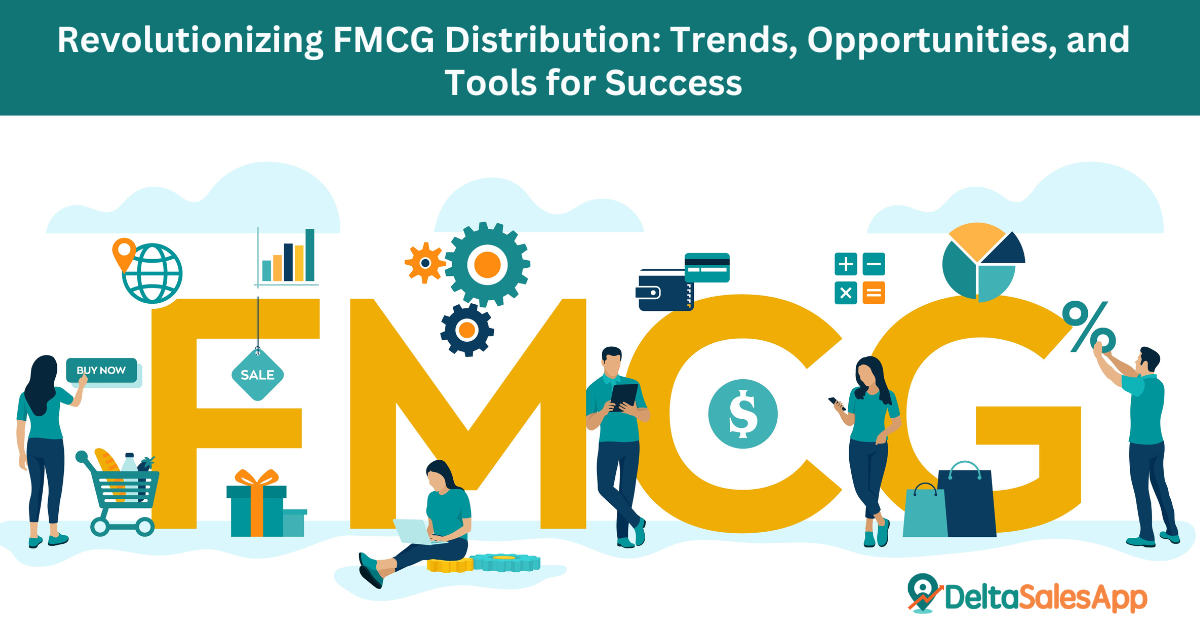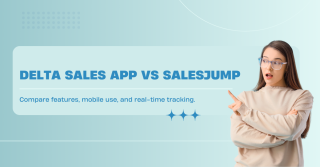Revolutionizing FMCG Distribution: Trends, Opportunities, and Tools for Success

The fast-moving consumer goods (FMCG) industry is one of the cornerstones of the global economy. Valued at over $70 billion and contributing significantly to both urban and rural markets, this sector has become an epicenter of innovation and growth. As we move toward 2024, FMCG businesses must embrace new trends, overcome persistent challenges, and adopt digital tools like Delta Sales App to stay ahead in the competitive landscape.
This blog delves deep into the current trends shaping the FMCG sector, challenges faced by distributors, and how technology can revolutionize business operations, with a specific focus on Delta Sales App.
Introduction to the FMCG Industry
The FMCG sector holds the title of the fourth-largest contributor to the global economy, comprising essentials like packaged food, beverages, personal care, and household items. Recent reports indicate that the sector is projected to grow from $70 billion to $103 billion by 2025.
Why the FMCG Sector Matters?
-
It directly impacts everyday life by delivering essential goods.
-
Rural areas account for nearly 40-45% of sales, showcasing immense growth potential.
-
Urbanization and increasing disposable income are driving premiumization and innovation.
For businesses, staying relevant in this fast-paced industry requires a clear understanding of trends, opportunities, and tools to enhance efficiency.
Emerging Trends Shaping FMCG Distribution
1. Innovation and Premiumization
FMCG companies are innovating in both product offerings and packaging to capture consumer attention. Premium products such as high-end biscuits, gourmet snacks, and luxury skincare lines are becoming increasingly popular. Urbanization has fueled demand for these items as consumers are willing to pay for enhanced quality and unique experiences.
Example:
-
Premiumization in Biscuits: Traditional glucose biscuits are now accompanied by gourmet cookies targeting urban customers.
-
Packaging Revolution: Brands like Indulekha have gained significant attention with innovative bottle designs, proving how visual appeal can influence buying decisions.
2. Health and Wellness Product
Consumers are prioritizing health, pushing demand for organic, natural, and Ayurvedic products. This has led to the rise of herbal shampoos, chemical-free skincare, and fortified food items.
Examples of Success Stories:
-
Patanjali: Leveraged Ayurvedic branding to gain a massive market share.
-
Organic Food: Growing consumer awareness has bolstered the demand for pesticide-free products, creating a robust niche market.
3. Rural Market Expansion
The rural market has been a focal point for growth in the FMCG industry, supported by government initiatives and infrastructure development. Tailored strategies such as offering small-pack sizes and affordable pricing have been key to penetrating these markets.
Why Rural Markets Matter?
-
7% annual consumption growth in rural areas.
-
Infrastructure improvements have enhanced rural connectivity and disposable income.
Companies that customize their offerings for rural audiences, such as smaller sachets for personal care products, see significant growth in these areas.
4. E-commerce Penetration
E-commerce is gradually reshaping FMCG distribution. Although online FMCG sales account for less than 1% of the market, this figure is expected to rise rapidly due to improved internet penetration and trust in online shopping.
E-commerce Benefits:
-
Wider market reach, especially in Tier-II and Tier-III cities.
-
Easier access to niche and premium products.
-
Convenience-driven buying for consumers.
5. Consumer Engagement Strategies
Brands are adopting innovative consumer engagement tactics to understand preferences and enhance loyalty. Social media campaigns, in-store activations, and personalized marketing have become integral to building connections with customers.
Example:
-
Sampling and live demonstrations in retail stores increase consumer trust and drive off-take.
Challenges in FMCG Distribution
Despite its growth, the FMCG industry faces persistent challenges in distribution and logistics:
1. Complex Supply Chain
FMCG distributors must cater to diverse geographies, including urban hubs and remote rural areas. Maintaining efficiency across such a wide network is challenging.
2. Inefficient Order Management
Traditional order-capturing methods often result in delays and errors, hampering business growth.
3. Expense Tracking
Distributors struggle to monitor operational costs such as fuel, rent, and salaries, leading to inefficiencies.
4. Market Credit and Claims
Delayed credit collections and untracked claims hurt cash flow and profitability.
How Delta Sales App Can Revolutionize FMCG Operations?
Delta Sales App is a comprehensive tool designed to address the unique challenges of FMCG businesses. By leveraging this technology, distributors can streamline operations and enhance profitability.
1. Simplified Sales and Order Management
The app automates order capturing and tracking, allowing sales teams to record orders in real time. This eliminates manual errors and ensures faster order processing.
Benefits:
-
Accurate data for better decision-making.
-
Time-saving for field sales representatives.
2. Effective Expense Management
With Delta Sales App, distributors can easily record and analyze expenses such as salaries, fuel costs, and rents.
Benefits:
-
Insights into cost optimization.
-
Improved tracking of shared costs for multi-brand distributors.
3. Real-Time Stock and Inventory Management
The app ensures optimal stock levels by tracking inventory in real time. This reduces instances of overstocking or stockouts, leading to better customer satisfaction.
Benefits:
-
Accurate inventory forecasting.
-
Reduced wastage and costs.
4. Credit and Claims Monitoring
Delta Sales App helps track outstanding credits and claims, ensuring timely collections and transparency.
Benefits:
-
Improved cash flow management.
-
Better relationships with retailers and customers.
5. Enhanced Field Team Productivity
The app enables route optimization, reducing travel time and fuel costs. Additionally, it helps field teams monitor in-store visibility and promotions effectively.
Benefits:
-
Higher efficiency for sales representatives.
-
Better execution of promotional campaigns.
6. Data-Driven Analytics and Reporting
Delta Sales App provides detailed reports on sales performance, market trends, and customer behavior.
Benefits:
-
Informed business decisions.
-
Identification of growth opportunities.
Actionable Steps for FMCG Businesses
1. Leverage Technology
Invest in tools like Delta Sales App to automate processes and reduce inefficiencies.
2. Embrace Trends
Focus on premiumization, rural markets, and health-oriented products to align with evolving consumer preferences.
3. Expand E-commerce Capabilities
Develop an online presence to cater to the growing base of digital shoppers.
4. Optimize Distribution
Adopt tailored strategies for different markets, such as smaller pack sizes for rural areas.
Conclusion
The FMCG industry is at a transformative stage, with innovation, rural market growth, and e-commerce reshaping the landscape. Businesses that adapt to these trends while leveraging tools like Delta Sales App can achieve sustainable growth and profitability.
Delta Sales App not only addresses the operational challenges faced by distributors but also empowers them to capitalize on emerging opportunities. As the industry continues to evolve, embracing such technology is no longer optional but essential for success.
Call to Action:
Ready to streamline your FMCG distribution? Explore the features of Delta Sales App today and take your business to the next level.









